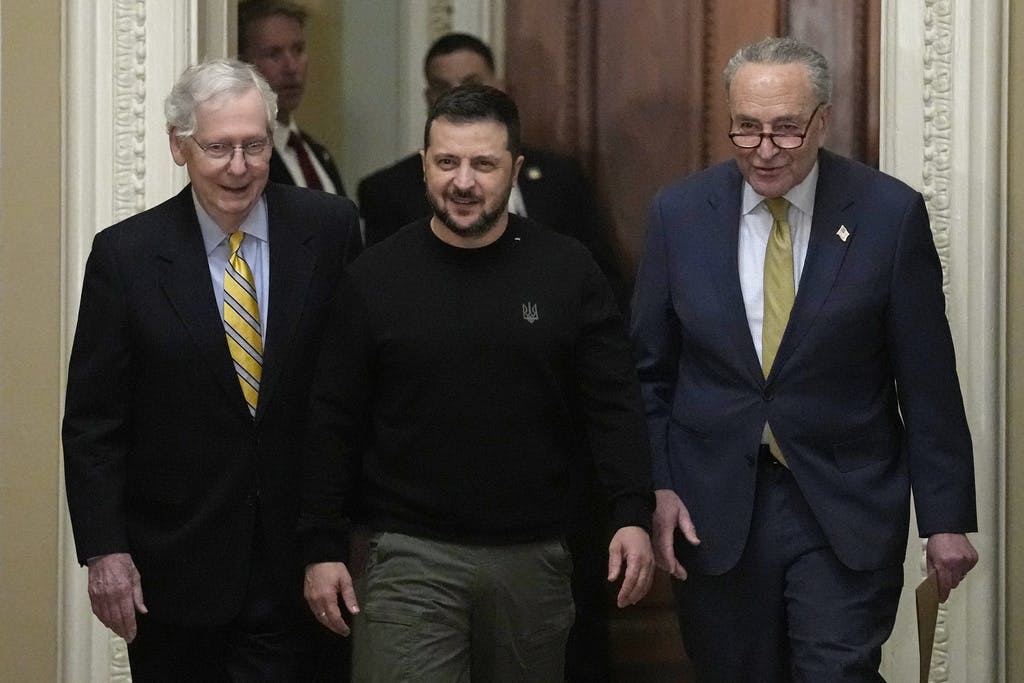The Foreign Policy Divides Splitting the Two Major Parties: Ukraine and Israel
The anti-colonialist left thinks America is too wicked to do good on the world stage. The anti-interventionist right thinks the world is too unlike us to benefit from our crusading.

In 2024, foreign policy doesn’t pit Republicans against Democrats so much as it pits Republicans against Republicans and Democrats against Democrats.
For President Biden’s party, Israel is the fault line, with Democrats split between supporters of the Jewish State and those of Palestinian sympathies.
For the party of President Trump, the internal conflict is over Ukraine, and the bitterness of the battle risks costing Congressman Mike Johnson his speakership.
These crises in the Middle East and on NATO’s frontier are catalysts for tensions that have been growing in both parties’ coalitions since the end of the Cold War.
America is the most powerful nation in the world, by far; what obligations does that impose on us for using our power to promote our values?
And what are those values anyway?
The anti-colonialist left thinks America is too wicked to do good on the world stage.
The anti-interventionist right thinks the world is too unlike us to benefit from our crusading — which instead only undermines what makes us special and strong at home.
The more internationalist right, on the other hand, sees greater danger to our institutions and way of life arising from insufficient engagement with a dangerous world, which will turn away from our values and interests if we don’t actively promote them.
That requires, they say, supporting friends and allies around the globe and confronting hostile states, ultimately, if necessary, with military force, and by every means short of that in the meantime.
The interventionist left, for its part, has the same confidence in government’s ability to improve the world outside our borders as it has in the competence of government at home.
And if engaging with the world erodes American distinctiveness, as some on the right fear, that’s a benefit rather than a drawback as far as these progressives are concerned.
These are basic dispositions.
They’re complicated by several hard realities that can’t be avoided no matter what one’s ideal policy might be — external threats, for one thing, and the limits of America’s unprecedented but not unlimited wealth and power for another, as well as the limits of national morale and political will in support of any long-term project.
There are serious debates to be had both on the left and the right.
Yet on the left, as is typical for that side of politics, protest often takes the place of serious discussion, especially on college campuses.
To judge by social media, one might think the right can’t have an adult conversation about foreign policy, either.
Yet an event I recently moderated suggests that conservatives can grapple intelligently with their differences.
The University of Texas at Austin held a debate — organized by UT’s Civitas Institute and my employer, the Intercollegiate Studies Institute — on the proposition “Resolved: America’s Defense of Ukraine Is Vital to Upholding the Liberal International Order,” with National Review’s Noah Rothman affirming the proposition and former Trump administration national security official Michael Anton opposing it.
Though Mr. Rothman and Mr. Anton didn’t come to a meeting of minds by the end of the debate, each made points that arguably worked in the other’s favor.
After an audience member asked Mr. Rothman how his fears of further Russian aggressions beyond Ukraine differed from Vietnam-era “domino theory,” Mr. Anton added that Singapore’s leader, Lee Kuan Yew, was reputed to have said that America really won the Vietnam War.
How so?
The resolve America showed in fighting the war signaled to the wider Indo-Pacific region that Communism could not expand easily and without resistance, even if Washington proved unable to save South Vietnam.
That message fortified the willingness of other states to resist Communism, including Singapore.
I asked Mr. Anton if this lesson applied to Ukraine.
Would it mean that even if American support wasn’t enough to defeat Russia, the heightened cost of President Putin’s war would still discourage further depredations by Moscow — or anyone else — and strengthen other nations’ inclinations to resist them?
Mr. Anton wasn’t convinced the precedent would apply in today’s circumstances.
Nevertheless, in sharing Mr. Lee’s opinion, he helpfully complicated the debate.
In turn Mr. Rothman acknowledged that his support for Ukraine did not extend to sending American troops to fight for Kyiv, even if Mr. Anton proved correct in his contention that nothing less than that would secure victory for Ukraine.
Mr. Rothman believed, however, that supporting Ukraine was the best way to keep America out of a European conflict, as Russian success would foment chaos on NATO’s borders and weaken the alliance architecture that kept Europe at peace.
There were no concessions on either side, yet the debate showed how conservatives with starkly different views could compare them productively.
It also showed a college campus can still hold a mature debate, not just another protest.
Creators.com
